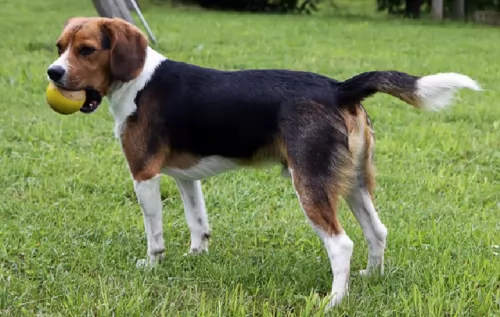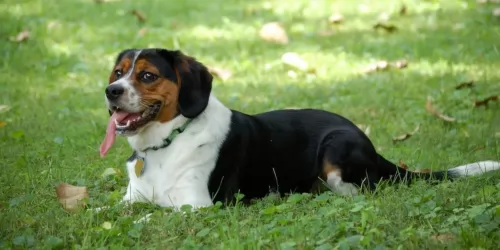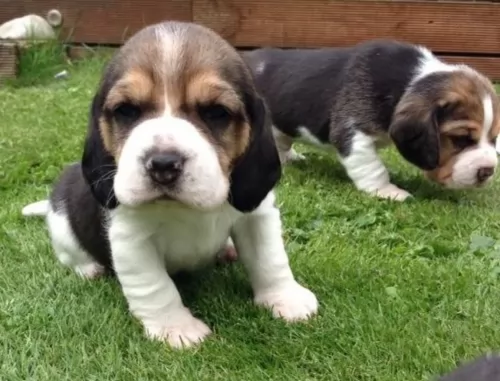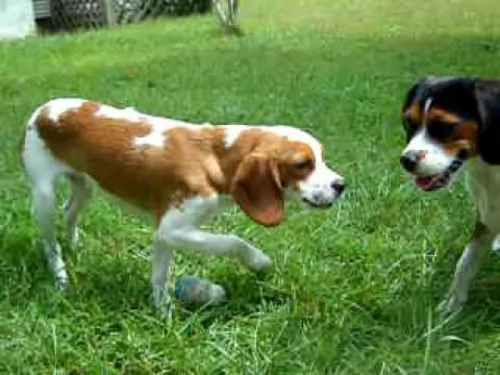 Petzlover
PetzloverBoth Australian Cattle Dog and Beaglier are originated from Australia. Australian Cattle Dog may grow 10 cm / 4 inches higher than Beaglier. Australian Cattle Dog may weigh 6 kg / 14 pounds more than Beaglier. Both Australian Cattle Dog and Beaglier has almost same life span. Both Australian Cattle Dog and Beaglier has almost same litter size. Australian Cattle Dog requires Low Maintenance. But Beaglier requires High Maintenance
During the 19th century, in the New South Wales, lived a cattle farmer Thomas Hall. He wanted to have a perfect cattle dog so he mixed two breeds: dogs used by stockman with the dingo. The new breed was given an interesting name - Halls Heelers. Heelers was a part of the dog breed because this new breed of the dog inherited the nipping instinct. As time passed, one breed was developing in two breeds: the Australian Cattle Dog and the Australian Stumpy Tail Cattle Dog.
The Australian Cattle dog can be found in two available colours: red and blue. This is how they got their nicknames: Red Heeler and Blue Heeler.
 The Beaglier beginnings are set in Australia. Before around 30 years, breeders cross-breed the Beagle and the Cavalier King Charles Spaniel. The result actually turned out great – new we have a small sized breed with a wonderful, soft coat, very likeable looks, the calm and gentle dog which is very active despite his relaxed nature. They can be found around the globe nowadays and they are very popular because of their sweet nature.
The Beaglier beginnings are set in Australia. Before around 30 years, breeders cross-breed the Beagle and the Cavalier King Charles Spaniel. The result actually turned out great – new we have a small sized breed with a wonderful, soft coat, very likeable looks, the calm and gentle dog which is very active despite his relaxed nature. They can be found around the globe nowadays and they are very popular because of their sweet nature.
The Australian Cattle Dog originally mixed with Australian herding dog that was kept near the cattle to guide them. Medium-sized, with the short coat, this dog is generally easy to groom and maintain. It does require more brushing during the shedding period, but it is still not an everyday need. He is easy to train because he likes challenging games and activities which are. It gets very attached to its owner, and he is always protective of them and their possessions. The most common health problems happen with their ears and eyes, but they are usually very healthy and they have a long life – up to 15 years.
 This small dog breed, called Beaglier and Beagler, has the look of his parents. Sometimes, they look more like the Spaniel, and sometimes they look more like the Beagle. This actually means that they are usually small, but can be, in some cases, even medium sized dog. They are usually tricoloured and in most cases, they have dark brown and cream hairs with white markings. They have longer ears, sometimes with more hairs if they look more like the Spaniel. They have large, dark brown eyes and usually dark nose. This breed is very loving and affectionate. They have a high need for a daily activity and they are the best choice for families with children.
This small dog breed, called Beaglier and Beagler, has the look of his parents. Sometimes, they look more like the Spaniel, and sometimes they look more like the Beagle. This actually means that they are usually small, but can be, in some cases, even medium sized dog. They are usually tricoloured and in most cases, they have dark brown and cream hairs with white markings. They have longer ears, sometimes with more hairs if they look more like the Spaniel. They have large, dark brown eyes and usually dark nose. This breed is very loving and affectionate. They have a high need for a daily activity and they are the best choice for families with children.
Children and Australian Cattle Dogs can grow up together in harmony. They will have a loyal and protective companion. After you properly train your dog and teach your child how to play with the dog, you will bring the friendship on the safe side. Some of them will have the instinct to nip at heels, so you should pay attention to this while training your pet.
Special talents: cattle dog, service dog, therapy dog, police dogs, drug detection dogs.
Australian Cattle Dogs can survive cool, hot and temperate conditions. They can live in a shelter outdoors, and they do well living indoors. But, be aware – without enough physical activity, this dog will end up being frustrated and unhappy.
They will absorb every new trick so quick that you will be amazed. They love to learn, and if you start with some good trick you will raise a great friend and maybe a great competitor in fetch, swim, bring-a-stick, or run-the-show dog sports.
 If you decide to bring a Beaglier to your family, it will be the best that you wait for your children to grow up a little bit. They are great to play buddy, but they get carried with the game and they can be very careless during the play. They fit perfectly with the children above the age of 5. They will run, jump, and do whatever your kid is about to do. They are friendly towards children they don’t know but they don’t do well with other animals they don’t know.
If you decide to bring a Beaglier to your family, it will be the best that you wait for your children to grow up a little bit. They are great to play buddy, but they get carried with the game and they can be very careless during the play. They fit perfectly with the children above the age of 5. They will run, jump, and do whatever your kid is about to do. They are friendly towards children they don’t know but they don’t do well with other animals they don’t know.
watchdog
One the main reasons why Beagliers are so much popular lay in their adaptability to any living conditions. They will fit in instantly in a family with children, but they will be happy as well if they live with just one person or even seniors. They can live indoors, houses and apartments without the yard. The Beaglier will enjoy the city parks, dog parks, beach, walking down the crowded streets. This breed is a not a quiet one – they will bark every time they notice something just to let you know. But, they are not aggressive type and they usually bark to communicate with people.
Usually, they are trained very easy. They have a stubborn nature, and if you learn how to get over with this temperament, you will be able to train and raise the sweetest dog ever. They should be trained and socialized while they are still puppies. Since they like too much, the best advice is to use treats to teach them everything that they will need to know. But, be careful with the feeding after the treats – Beagliers get easily obese if they are overfed.
Health Problems: are mostly inherited. You can avoid this by searching for a good breeder that can clear out the hereditary diseases.
The Australian Cattle Dog is one of the breeds that can be born with progressive retinal atrophy. Progressive rod-cone degeneration is a disease that causes the rods and cones in the retina of the eye to degenerate. It might lead to blindness.
The Australian Cattle Dog is one of the rare breeds with recessive piebald alleles. This gene is the reason why they have white colour on their coat. But, unfortunately, this gene can be the reason why congenital hereditary deafness develops.
 The Beaglier flap ears can be a very great place for the fungi, bacteria and dirt. You will have to clean their ears with an ear cleaning solution and a soft tissue once a week, especially if your pet is playing outside.
The Beaglier flap ears can be a very great place for the fungi, bacteria and dirt. You will have to clean their ears with an ear cleaning solution and a soft tissue once a week, especially if your pet is playing outside.
Cherry eye: Starts as redness in the corner of the eye. Happens when the third eyelid gland slips out of its place and show up as a red blob in the corner of the eye. Sometimes, the gland gets back to its original place in a couple of days, but it will be the best if you can take your dog to the vet as soon as you notice any readiness in his eyes.
Glaucoma: Happens because of the high eye pressure. This affects the normal outflow of the eye fluids and can cause blindness if not treated. It is the best to for your beagle to regular eye checks since this condition is not easy to diagnose in the begging.
Herding dog have a history of the joint diseases. That’s why some of the pet suggest feeding a herding dog with meat like chicken, turkey, beef, lamb and fish. Dry dog food, even premium quality, may not be enough for this energetic dogs and their bone structure. But it depends on the dog. The best advice is to always take an advice from your breeder or your wet.
You won’t be very busy with grooming your Australian cattle dog. You don’t have to take everyday care of it. Occasional brushing will be more than enough. Bath the dog only when you notice odour problem.
The Australian Cattle Dog needs a high level of activity. Like many other herding dog breeds, they love walks, spending time with people, running or doing any athletic sports with them, teaching them tricks since they have above average intelligence. Fetching will be super fun for everyone, agility, competitions or any other challenging activity. They love water and they swim very well so you can take the dog with you to the nearest pool and have a great time.
 If you are not sure about the dog food you should give to your Beaglier considering the living environment and the lifestyle, it is always the best option to listen to the vet’s advice. They are prone to the obesity so you should keep a schedule that won’t be changed much. Feed them every day at the same time, no more than two meals per day once they get older than 6 months.
If you are not sure about the dog food you should give to your Beaglier considering the living environment and the lifestyle, it is always the best option to listen to the vet’s advice. They are prone to the obesity so you should keep a schedule that won’t be changed much. Feed them every day at the same time, no more than two meals per day once they get older than 6 months.
If you want your Beaglier to be happy, make sure you groom him daily. You will need about 5 minutes per day to brush him and keep him out of the tangles. Bathe then once in a month, that will be enough. Clip their nails regularly. Keep their ears cleaned.
They need a daily activity or they will get destructive. Be careful with the feeding since they get obese very quickly.
Since they are natural hunters, they will like to play chase. You can take them to the woods for a walk or for a run but make sure you train them to respond to your commands before you take them off the leash. They are very curious and they will easily wander off. They can be taught to play inside the house as well. They love to explore new areas so it will be great if you can take them with you for a holiday.